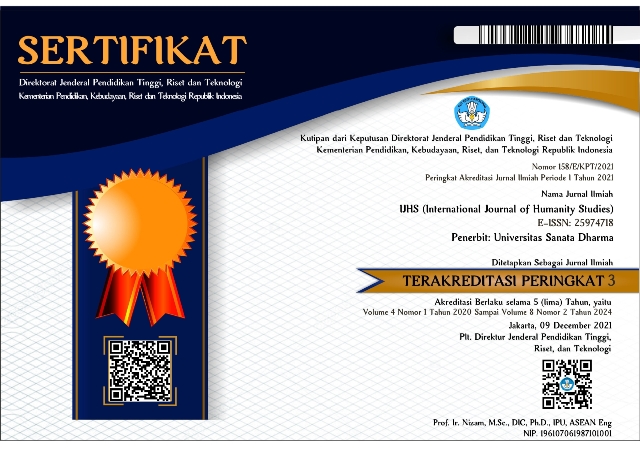POSTHUMANISM IN TWO FANFICTION STORIES: THE CYBORG AND CYBORG
Abstract
Since the development of Artificial Intelligence (AI) has widely spread in many sectors of humans life, the studies of posthumanism where humans ask critically about their existence are needed. Knowing that, this research will deal with posthumanism (Herbrechter, 2015) drawn from two fanfiction stories entitled The Cyborg and Cyborg. Both stories are written by different authors from different countries. This study is a library research which applies comparative study as part of data analysis technique and the result of data analysis will be presented qualitatively. Preliminary result that is taken from first reading of the two stories deals with young authors who think that cyborgs have more humanistic values when they are being compared to humans. The researcher hopes that this study has insightful effect to pre-service students in dealing with the development of technology in this revolution industry 4.0.
Full Text:
PDFReferences
Ahmadi, A., Ghazali, A. S., Dermawan, T., & Maryaeni, M. (2018). Indonesian Literature, Trans-species, Post-humanism Aesthetic: Interpreting Novel O, Animal Studies Perspective. Theory and Practice in Language Studies, 8(2), 257-265.
Amberson, D., & Past, E. (2016). Gadda's Pasticciaccio and the Knotted Posthuman Household. Rel.: Beyond Anthropocentrism, 4, 65.
Apristia, L. D. (2019). THE MYTH OF FEMALE BEAUTY: STUDY OF REPRESENTATION TOWARD POST-NEW ORDER NOVELS WRITTEN BY MALES. International Journal of Humanity Studies (IJHS), 2(2), 141-157.
Carretero-Gonzalez, M. (2016). The Posthuman that Could Have Been: Mary Shelley's Creature. Rel.: Beyond Anthropocentrism, 4, 53.
Clarke, B. (2008). Posthuman metamorphosis: Narrative and systems. Fordham University Press.
Ferrando, F. (2013). Posthumanism, transhumanism, antihumanism, metahumanism, and new materialisms. Existenz, 8(2), 26-32.
Gough, N. (2004). RhizomANTically becoming?cyborg: Performing posthuman pedagogies. Educational Philosophy and Theory, 36(3), 253-265.
Hedrick, A. (2018). One Direction Real Person Fiction on Wattpad. com: A Textual Analysis of Sex and Romance (Doctoral dissertation, The University of North Carolina at Chapel Hill).
Herbrechter, S. (2015, June). Posthumanist Literature?. In Conference on Approaching Posthumanism.
Huang, M. N. (2019). The Posthuman Subject in/of Asian American Literature. In Oxford Research Encyclopedia of Literature.
Indriyanto, K. (2019). Hawaiis Ecological Imperialism: Postcolonial Ecocriticism Reading On Kiana Davenports Shark Dialogues. International Journal of Humanity Studies (IJHS), 2(2), 123-133.
Iovino, S. (2016). Posthumanism in literature and ecocriticism. Rel.: Beyond Anthropocentrism, 4, 11.
Koskimaa, R. (2018). 1.2 Management Skills. This is a self-archived version of an original article. This version may differ from the original in pagination and typographic details., 33.
Manggong, L. (2020). POSTCOLONIAL ECOCRITICISM IN HUNGER BY ELISE BLACKWELL. International Journal of Humanity Studies (IJHS), 3(2), 137-149.
Manresa, M. (2018). Adolescent reading habits: The effect of school activities on reading practices. In Young People Reading (pp. 123-136). Routledge.
Mambrol, Nasrullah. (2018). Posthumanist Criticism. Retrieved on 05th February 2020 from https://literariness.org/2018/07/25/posthumanist-criticism/
Mulatsih, M. V. E. (2020). Introduction to prose in English language teaching. Sanata Dharma University Press.
Murata, K., Adams, A. A., Fukuta, Y., Orito, Y., Arias-Oliva, M., & Pelegrin-Borondo, J. (2017). From a science fiction to reality: Cyborg ethics in Japan. ACM SIGCAS Computers and Society, 47(3), 72-85.
Phoca, S. (2004). Feminism and gender. In The Routledge Companion to Feminism and Postfeminism (pp. 57-64). Routledge.
Precup, A. (2017). All Cyborgs are Asian: The Ethnic Implications of the Cyborg-topian Future in Karen Tei Yamashitas Anime Wong. Transylvanian Review, 26(Suppl 2), 247-256.
Rahmi, M. S., Rahmat, N., & Saleha, A. (2018, April). POSTHUMAN IN JAPANESE POPULAR CULTURE: VIRTUAL IDOL HATSUNE MIKU. In AICLL: ANNUAL INTERNATIONAL CONFERENCE ON LANGUAGE AND LITERATURE (Vol. 1, No. 1, pp. 81-86).
Reimann, W., & Kaiser, S. (2019). Sorting Stories Out: Classifications and Classifying in Fan Fiction. In Infrastructuring Publics (pp. 139-167). Springer VS, Wiesbaden.
Risam, R. (2019). What Passes for Human?. Bodies of Information: Intersectional Feminism and the Digital Humanities.
Ryan, J. C. (2015). Beyond East Asian Landscapes: A Survey of Ecocriticism in Thai Literary Studies. In Refereed Proceedings of the International Conference on Trends in Economics, Humanities and Management (pp. 26-30).
Wolfe, Cary. (2010). What is posthumanism? Minneapolis: University of Minnesota Press.
Yulianeta, Y., & Utami, M. I. (2019, March). The Life Potrait of Urban Society within O, the Novel by Eka Kurniawan. In Second Conference on Language, Literature, Education, and Culture (ICOLLITE 2018). Atlantis Press.
DOI: https://doi.org/10.24071/ijhs.v4i1.2493
Refbacks
- There are currently no refbacks.
Copyright (c) 2020 Maria Vincentia Eka Mulatsih

This work is licensed under a Creative Commons Attribution-ShareAlike 4.0 International License.
Indexed and abstracted in:
IJHS Sinta 3 Certificate (S3 = Level 3)
International Journal of Humanity Studies (IJHS) has been nationally accredited Sinta 3 by the Ministry of Education, Culture, Research and Technology of the Republic of Indonesia based on the decree No. Surat Keputusan 158/E/KPT/2021. Validity for 5 years: Vol 4 No 1, 2020 till Vol 8 No 2, 2024

This work is licensed under CC BY-SA.
Creative Commons Attribution-ShareAlike 4.0 International License.
p-ISSN: 2597-470X (since 31 August 2017); e-ISSN: 2597-4718 (since 31 August 2017)
International Journal of Humanity Studies (IJHS) is a scientific journal in English published twice a year, namely in September and March, by Sanata Dharma University, Yogyakarta, Indonesia.
Note: The opinions expressed in this publication are those of the authors. They do not purport to reflect the opinions or views of the editorial team or publishers.

















